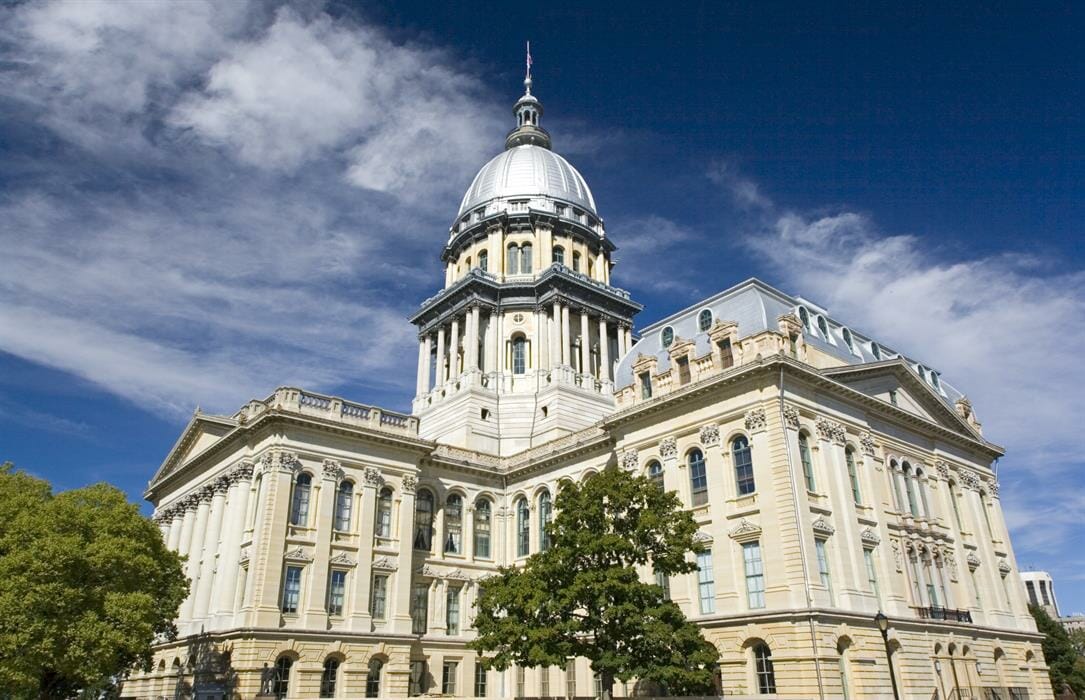2019 Spring Session Update: 1 Week Out

By Stephen S. Morrill, Principal of Morrill & Fiedler LLC (M&F), with contributions from Curt Fiedler
The House and Senate convene the final week of the scheduled 2019 spring session - with adjournment scheduled for Friday, May 31. Almost all of the Governor’s legislative priorities – graduated income tax amendment, fully funded budget, capital budget, legalizing cannabis, and sports betting – remain unresolved with only five legislative days remaining (though much work can be completed in these final days). The legislative leaders and the Governor continue to meet this week to try and develop a bi-partisan agreement on many of these issues; however, the meetings have yet to produce even a framework of a deal among all four legislative leaders. The most recent “leaders meeting” to develop an agreed framework on the FY20 budget and capital (including new revenues) occurred on Sunday, May 27.
A status update of the Governor’s legislative priorities remaining is as follows:
- Graduated Income Tax Amendment (SJRCA 1): SJRCA 1 was approved by the Illinois Senate on May 1, and has slowly advanced to the House floor. The House debated SJRCA 1 for more than three hours (unlike the brief debate and quick passage in the Senate), and approved SJRCA 1 by a vote of 73-44-1. With the approval by the House, the question to amend the Illinois Constitution to allow for a graduated income tax will be included on the ballot for voters in 2020. Also before the House are Senate Bill (SB) 687, SB 689 and SB 690 – the companion bills that would set the graduated income tax rates (SB 687), limited property tax relief (SB 690), and eliminating the real estate transfer tax (SB 689). While SB 687 is currently pending on the House floor, the other measures to provide additional financial relief (especially property tax relief) have been stripped and their passage is uncertain.
- FY20 State Budget: The Democratic legislative leaders have developed multiple versions of the FY20 budget based upon different scenarios of projected revenues. The scenarios range from a maintenance budget (as the State has received an additional $1.5 billion in revenues not previously anticipated) to the Governor’s proposed FY20 budget that relies on revenues from sports betting and legalization of cannabis. According to sources, the House is likely to pass its version of the FY20 budget by Tuesday, May 28 to afford the Senate sufficient time to properly consider the FY20 budget and make any changes that may be necessary prior to the May 31 adjournment. It is possible that the General Assembly passes a FY20 spending plan that exceeds the projected revenues due to the General Assembly failing to advance some of the Governor’s expected revenue increases to fund the FY20 budget (legalization of cannabis, sports betting, increased cigarette tax, vaping tax, cap on retailer sales tax discount, statewide plastic bag tax, and restructuring VGT taxes, among others). If that scenario occurs, it would leave Governor Pritzker to use his amendatory and line-item veto powers to “right size” the FY20 spending plan, or force the Governor to call the General Assembly back into session over the summer to pass additional revenues.
- Capital Budget: Governor Pritzker unveiled the preliminary framework of his anticipated capital infrastructure program last week. According to the Governor’s press release, it is a six-year, $41.5 billion dollar program, and includes both the funding component of the program and an initial list of projects. Regarding funding for the capital construction program, of the $41.5 billion: (a) total bonding over six years will be $17.8 billion; (b) total “pay as you go” will be $7.035 billion over six years; (c) total federal money is banked at $10.032 billion; and (d) local/private share is listed as $6.642 billion. Included in the $41.5 billion spending includes: transportation, education, state facilities, environment and conservation, broadband deployment, healthcare and human services, and economic and community development. Among the revenue and fee increases proposed to pay for this spending includes: motor fuel tax increase (19 cents per gallon for gas and diesel), vehicle registration fee increases, real estate transfer tax fee increase, per-gallon liquor tax increase, state video gaming terminal tax restructuring, and newly created taxes on ridesharing, television and streaming services, and parking garages.
Separately, the General Assembly’s working group on capital construction continue their regular meetings to develop a final legislative capital projects program (mostly based on the Governor’s framework). It is unclear at this time what revenue sources will be utilized to fund the capital program – as many of the Governor’s proposed revenue streams are strongly opposed and there continues to be consideration for utilizing gaming expansion revenues for a portion of capital funding. Further, the working group continues to meet with legislators and the Governor’s office to finalize the list of projects to be included within the full capital plan. It is unclear at this time whether the capital bill will be approved before the May 31 adjournment, or if the General Assembly will reconvene in June to pass a final capital plan. - Cannabis Legalization: Negotiations continue toward final language for adult-use cannabis legislation, and it is expected that the measure will move quickly after the final amendment is filed. SB 7 is still expected to be the legislative vehicle for this measure (though that could change) - which is currently on the order of Third Reading in the Senate and poised to be voted on at any time; however, like the FY20 budget, SB 7 would need to advance out of the Senate by Wednesday, May 29 in order to allow the House adequate time for consideration before adjournment. While some legislators remain undecided on their ultimate vote (some indicating that inclusion of home grow could make them a “no” vote), sources within the negotiations indicate the latest changes have satisfied the concerns expressed by both the Black and Latino caucuses, and that both caucuses will largely support the bill. Legalizing adult-use cannabis is largely expected to be approved prior to adjournment on May 31, and likely will have bi-partisan support.
- Gaming Expansion/Sports Betting: Negotiations continue to finalize a gaming expansion and sports betting bill. According to those in the gaming negotiations, a decision has been made to include legalizing sports betting within the long-standing gaming expansion bill to allow for a City casino, five additional casinos, and slots-at-racetracks. Negotiations currently focus on: (a) updating language on the City casino to reflect request from the Lightfoot administration; (b) updating the slots-at-racetracks provision to reflect the changes necessary after two racetracks have closed in recent years; and (c) how to structure a balanced and legal sports betting framework (number of licenses, entities allowed to obtain a license, and revenue splits). Further, there remains conflict among the leaders regarding whether to utilize any of the new gaming revenues for capital project expenditures. As with the other measures, the passage of a large gaming expansion bill remains possible before the May 31 adjournment deadline.
One significant set of legislative issues that legislative leaders have determined will be deferred until the fall (or possibly the spring of 2020) are the large energy policy bills offered earlier in the spring:
- SB 2080/HB 3152 (ComEd’s extension of its formula rates)
- SB 660/HB 2861 (Exelon’s statewide capacity auction)
- SB 1781/HB 2666 (Pathway to 100 proposal to increase renewable energy standards to 40% by 2050)
- SB 2132/HB 3624 (Clean Energy Jobs Coalition proposal to procure “carbon free” energy by 2030 and 100% renewable by 2050)
- HB 2173 (Vistra’s “coal-to-solar” initiative)
- SB 135/HB 125 (NRG’s proposal for a “clean energy attributes” state procurement)
It is expected that stakeholder meetings will be convened over the summer and fall months to further study and negotiate these issues with the goal of possibly having an agreed framework to modify Illinois’ energy policy by 2020. It has not yet been determined when these stakeholder meetings will begin.

About the Author
Steve Morrill is an attorney who concentrates in the government relations and administrative law areas, having served as a lawyer, lobbyist and government official for approximately 20 years.

